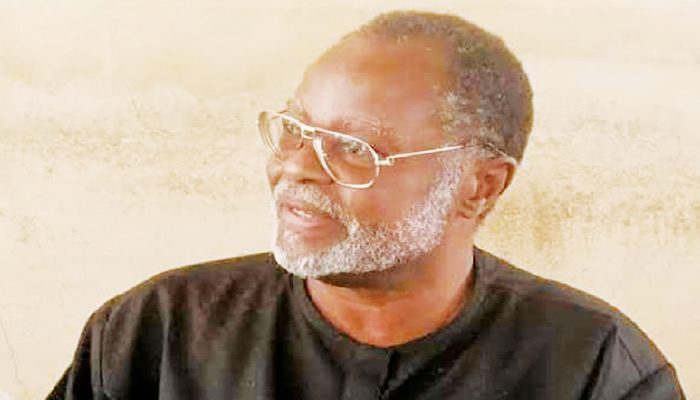
Prof Udenta Udenta, the founding National Secretary of the Alliance for Democracy, is a fellow at the Abuja School of Social and Political Thought. He speaks with FRIDAY OLOKOR on the February 25 presidential election, the controversy over the naira Design policy, among other issues
As we prepare for the 2023 election, what type of President does Nigeria actually needs?
A President is a product of social formation. So while I’m looking at the kind of president the country needs, I’m also looking at the kind of system that Nigeria has because you cannot separate the two. The President is in charge of the executive branch, which includes all ministries, departments, and agencies.
So we need to have a good President, a good parliament, a good judiciary, a good security apparatus, a good civil society, and a good media for Nigeria to function optimally.
So I’m looking more broadly at some of these issues and not narrowly at the kind of President the country requires.
In the presidential contest, one can say that there are three or four main contenders for power. We have two traditional, conventional, and orthodox parties: the All Progressives Congress, which is in power, and the Peoples Democratic Party, which has been out of power for almost eight years. There are also a number of insurgent political platforms, like the Labour Party and the New Nigeria Peoples Party, and other smaller ones.
So the main contest for power is between these four parties, principally the APC, PDP, and LP. I’ve been on television a number of times this period, and I’ve made very declarative statements that Atiku Abubakar of the PDP will be the winner of the presidential election on the basis of three factors.
One is the convergence of national forces building around him from the North and spreading southward. People may not detect this subterranean phenomenon, but it’s happening before our eyes.
The second factor is the abject performance of the APC government. On several parameters, nothing recommends this government, including the persistent scarcity of petroleum products and the confusion and chaos created by the Naira redesign and swap policy and to top it all, insecurity in different phases in the six geographical zones. This is indeed the legacy of the APC government and the inheritance of Bola Tinubu, who is going to run for President Muhammadu Buhari’s third term, whether he likes it or not.
The third factor I mentioned is geography and demography. What do I mean by geography and demography with regard to the electoral behaviour of Nigerians? Nigerian politics is not yet completely enlightened. That is, substantive politics—competence, efficiency, rationality, and logic—remain absent from our political motivations, choices, and preferences. This means that certain primordial tendencies will drive these political choices and preferences.
In my media outings, I did mention that if Peter Obi of the Labour Party is expected to do well in the South East and Bola Tinubu of the APC may do well in the South West, why do people not think that Atiku Abubakar of the PDP will not do well in the whole North? So I believe strongly that if he does very well in the North and picks up good votes across the whole South, he will win on the first ballot.
Have you completely written off the power of the incumbency, the ruling party, APC?
The APC government has failed miserably. Even with the scores of fuel scarcity and the chaos and pain of the APC currency redesign project, it will be magical for the party to even win more than a single geopolitical zone in the election, and that is even with the primal scream of geography and demography.
Added to the above is the fact that this is a party that is now broken into pieces. This is a party that is completely incoherent now.
Over seven APC governors sued the President of the Federal Government, who is a member of their party, and the Central Bank of Nigeria, which is led by someone who nearly ran for office under its banner, to challenge the party’s core economic and monetary policies.
There’s a struggle by Tinubu and El-Rufai to distance themselves from their own party in power, to distance themselves from their own president, and to distance themselves from the Central Bank of Nigeria that is organising the implementation of the monetary policy of their party.
The tension in the APC between the Buhari faction and the Tinubu-El-Rufai faction is occasioned by the latter’s disdain for the former, by its bitterness towards the presidential forces they believe are opposed to Tinubu’s candidacy, and by the collective failure of governance under the watch of the party, which is dragging its campaign on the path of political perdition.
In essence, given all these factors, particularly the acute poverty and insecurity in the land, it will be a huge shock to the nation and the world at large if the APC does well in the upcoming presidential election.
How can you assess President Buhari’s legacy? Again, what is the chance of PDP winning the election with the ongoing battle with the G5 governors? Is the APC not better positioned to nick it?
If I approach your question through a partisan or even a political lens, my assessment will be harsh, given the state of the nation and where Tinubu has assured us he will take us if he continues on the path he has promised.
But if I use historical parameters to examine his legacy, I will be more measured in my evaluation.
With time, the rough edges of his presidency may be smoothed out, and some of the positive things he accomplished may be highlighted.
Buhari’s legacy is an unsettled project, historically speaking, in spite of its current shabby state and the shabbier inheritance that Tinubu may foist on the nation if he were to somehow win.
The challenge Buhari is having is that the people around him, who are part of his team, are all fighting one another. So there is no unity of purpose in the party from the beginning to the present moment.
Concerning the CBN’s Naira redesign policy, I believe that the fight in court is political. It’s an illustration of the internal self contradictions in the APC and a manifestation of its ideological incoherence as a mere contraction, a mere contingent force for the enablement of power.
The PDP is even better situated than the APC administratively, given that its internal tensions centre on the blunted insurrection by the G-5 governors.
But with the APC, the governor of the party taking their president and his government to the Supreme Court to destroy their own legacy is a big deal. This is as alarming as Tinubu and El-Rufai insinuating that some dark elements in the Villa have hijacked the reins of power and are holding the president and the nation hostage in order to sabotage the economy.
Let me repeat it. What I’ve described above is the legacy of the Buhari regime, which is unfortunately Bola Tinubu’s inheritance. That is what he will run on. He cannot run on his own terms; he has to run on Buhari’s accomplishments, and he has repeatedly said that that is precisely what he intends doing.
Talking about this naira redesign, a lot of theories have been advanced on why it is being done at this particular point in time. What is really going on here?
While I cannot speak for the CBN, I think that they’ve made it clear why the Naira redesign is imperative now. If I recall it very well, the Central Bank governor said that this is the first time in over 19 years that it’s been done, while in other countries it happens on a fairly regular and consistent basis. He also specifically explained that the policy is meant to target counterfeiters of the national currency and hoarders, many of whom have acquired the funds illegally. He was also particular about targeting the flow of funds to kidnappers and terrorist bandits as well as rendering the huge funds warehoused by them worthless.
Another thing he mentioned, if I recall correctly, is that the policy will help demonetise the electoral process by limiting the funds available to unscrupulous politicians.
On paper, these appear to be good policies, but just like almost everything touched by the APC government, something went amiss and the seed of chaos, disorder, and confusion was sown.
While the policy of recovering the old notes proceeded apace, the release or infusion of new notes into the system ran into troubled waters.
Before Nigerians knew it, several APC governors and the party’s presidential candidate were missing in action during the eight-month ASUU strike and didn’t take the government to court; they maintained studied silence as terrorists and bandits ravaged the land; they didn’t go to court against poverty and millions of out-of-school children; and they didn’t challenge the government to bring back the remaining Chibok girls, the Dapchi girls, and others.
What is the business of the APC governors with the apex court with reference to the recirculation of the old notes? My thinking is that they should be more concerned with the availability of the new notes. If the energy being poured into bringing the old notes back into the system at all costs during the upcoming presidential election had been deployed towards getting the CBN and the need to print more new notes, a lot could have been achieved. Only the APC governors can explain their extravagant and extraordinary fascination with the old notes.
The APC governors want to bring back something a lot of us don’t have, and even in rural areas, the battle cry would have been compelling the CBN to allocate adequate new notes to those domains. This policy was started in October 2022.
In 1984, the currency swap lasted only 14 days, if I’m not mistaken. This one is at least three months old. So if you have three or four months to do this, and rather than engage the CBN on the ways and means of getting the new notes in circulation, you are suing them at the Supreme Court as an avenue of recirculating an unspecified amount of the old notes into the system, one wonders what their true intent is.
What is your view on the agitation by the South East towards the presidency?
The South East Presidency project is grounded in history, which is why the people are passionate about it.
Similarly, the North East agitation for the presidency has a long history.
Since 1966, the two zones have never tasted presidential power because of the consolidation of the political hegemony of the South West and the North West both during the era of military dictatorships and since the restoration of democratic governance in 1999.
This is precisely why a lot of people are saying, okay, the presidency is one important method of righting this historical wrong done to the two zones.





